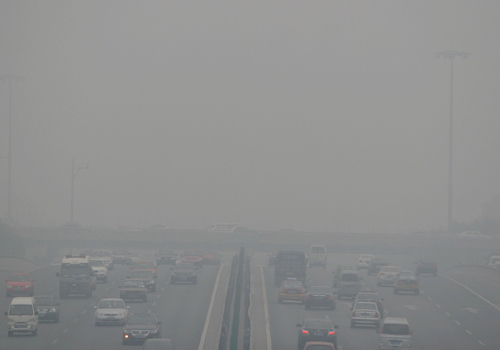|
 |
|
LOW VISIBILITY: A hazy day of Beijing in November (XINHUA) |
China's Ministry of Environmental Protection began to gauge public opinion on the revised Air Quality Standards for the second time since November 16. The new standards will include readings of concentrations less than PM2.5 (particulate matter smaller than 2.5 micrometers). Moreover, tighter rules will be set for some pollutants already monitored, such as nitrogen oxide and PM10.
In recent months, continuous hazy days in some areas of north China have raised awareness of PM2.5, a major factor in haze harmful to health. In developed countries, PM2.5 is an important air-quality index, but in China this standard is not used.
Due to industrial production and car exhaust emissions, the concentration of PM2.5 is very high in some cities in China. Thus, if PM2.5 is included in air-quality standards, some cities will have a very bad air-quality record. Experts predict only 20 percent of cities in the country can meet the new air-quality standard, instead of the current 80 percent. While an instant improvement on air quality is impossible, the problem now is whether cities are ready to see a bad record of air quality once PM 2.5 is included.
To include PM2.5 in air-quality standards is a necessary measure to improve the current air monitoring. By doing so, the monitoring result will offer more objective monitoring of air quality that is expected to be closer to the public's feeling.
Beijing Youth Daily
The Beijing Municipal Education Commission has banned schools in the city from organizing subject contests and competitions for students.
It's all right for social institutes to organize training and contests, because they only offer an extra choice for students, but do not force students to take the training. If a contest is not something that students are forced to take part in, it is acceptable.
The commission said it's not entitled to punish the organizer of subject contests, but it is authorized to punish those schools cooperating with contest organizers in student recruitment. It's an open secret that some prestigious schools use students' contest results as a measurement to recruit students. For years, the education departments have been cracking down on the connection between various contests and entrance examinations to higher education. However, so far not a single school has been punished for this.
It is time to break the connection between contests and school entrance examinations. If education resources are still unbalanced and there still are big gaps between schools, it's impossible to see a real retreat of various subject contests.
The Beijing News
In Zhujia Township, southwest China's Sichuan Province, a policy has been carried out for six years: All guests of the local government, officials or businessmen, are offered a 15-yuan ($2.3) meal in the dining hall of the government. Cigarettes are never given by package, but by piece, while only locally made wine is available.
This policy which seems impossible, has sustained for six years and still continues. However, it's a pity that this good behavior is only practiced in a remote township and to a large extent the implementation of the policy depends on the governor of the township. It's hard to say whether this practice can sustain once this official leaves.
This is only an individual example. There are not many systematic and realistic policies to support this kind of practice yet. Although the policy is highly praised by higher-level governments and visitors, it does not mean this model will be extensively copied.
On many occasions, offering higher-level visiting officials luxurious dinners is considered the responsibility of some local governments. What is precious about the township's 15-yuan reception meals is not the low standard, but the local government's courage to challenge the common bad habit.
People's Daily
The China Writer Rich List 2011 was announced recently, with Guo Jingming, Nanpaisanshu and Zheng Yuanjie standing at the top three positions in terms of annual royalties incomes.
Whenever the writer rich list is issued, criticism will come. Some people believe this list is encouraging money-worshiping among Chinese writers. It is degrading to literature. This kind of thinking is unnecessary, because the copyright revenue is only one of the many methods to measure a work's value, not the most important one. The writers' income list could show the reading trend of the public and the development direction of the publishing industry.
The popularity of the top 10 writers on the list tells us Chinese readers, especially the young, are interested in superficial and sugar-coated literature. It's good to see that young people compose the majority of readers of these books. It's said that a nation that loves reading is hopeful.
Nevertheless, the list shows the young readers are excessively fond of superficial or light literature, using books mostly to kill time. It's really a pity. The adolescents are pressured under huge schooling burdens, while the youngsters are under the pressure of how to mingle with society. So reading books of sweet style to relax is justifiable. But, as the nation's future masters, young people should also read some serious literature to broaden their minds and learn to think deeply.
Beijing Youth Daily | 